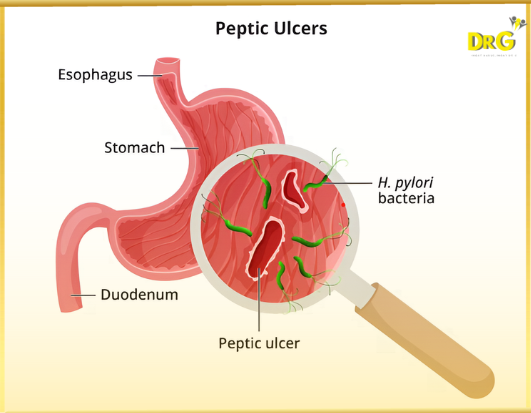Introduction
Peptic ulcers are open sores that develop on the inner lining of the stomach, upper small
intestine, or esophagus. They occur when the protective mucus layer that lines these organs is
reduced, allowing stomach acid to damage the tissue. This condition can lead to significant
discomfort and, if untreated, serious complications.
Causes of Peptic Ulcers
The primary causes of peptic ulcers include:
1. Helicobacter pylori Infection: This bacterium is a major cause of peptic ulcers. It
damages the mucous coating that protects the stomach and small intestine.
2. Nonsteroidal Anti-inflammatory Drugs (NSAIDs): Frequent use of NSAIDs, such as
aspirin, ibuprofen, and naproxen, can irritate or inflame the lining of the stomach and
small intestine.
3. Other Factors: Stress, spicy foods, and smoking are not direct causes but can
exacerbate the condition. Excessive alcohol consumption can also contribute to the
development of ulcers.
Symptoms of Peptic Ulcers
Common symptoms include:
● Burning stomach pain, often between meals or at night
● Bloating and burping
● Nausea and vomiting
● Dark or black stools, which indicate bleeding
● Weight loss and appetite changes
Diagnosis
Peptic ulcers are diagnosed through:
1. Endoscopy: A procedure where a thin tube with a camera is inserted through the mouth
to view the stomach and duodenum.
2. Barium X-rays: A patient drinks a barium solution that coats the digestive tract, allowing
ulcers to be seen on X-rays.
3. Tests for H. pylori: These include breath, blood, and stool tests to detect the presence
of H. pylori infection.
Treatment
Treatment
Treatment aims to reduce stomach acid, heal the ulcer, and eradicate H. pylori if present.
Common treatments include:
1. Medications:
○ Antibiotics: To kill H. pylori.
○ Proton Pump Inhibitors (PPIs): To reduce stomach acid production.
○ H2-receptor Antagonists: To decrease acid production.
○ Antacids: To neutralize stomach acid.
○ Cytoprotective Agents: To protect the lining of the stomach and small intestine.
2. Lifestyle Changes: These include avoiding NSAIDs, limiting alcohol, quitting smoking,
and managing stress.
Complications
If untreated, peptic ulcers can lead to serious complications such as:
● Internal Bleeding: Leading to anemia or severe blood loss.
● Perforation: A hole in the stomach wall that can lead to infection.
● Obstruction: Swelling or scarring that blocks food passage through the digestive tract.
Prevention
Preventive measures include:
● Avoiding or limiting NSAID use.
● Limiting alcohol consumption.
● Quitting smoking.
● Eating a balanced diet and managing stress.
● Proper hygiene to avoid H. pylori infection.


